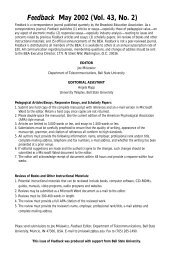Feedback
VOLUME 50 ⢠NUMBER 1 ⢠JANUARY 2009 - Broadcast Education ...
VOLUME 50 ⢠NUMBER 1 ⢠JANUARY 2009 - Broadcast Education ...
- No tags were found...
You also want an ePaper? Increase the reach of your titles
YUMPU automatically turns print PDFs into web optimized ePapers that Google loves.
follow the process when you can appeal directly to the provost or president? But violatingprotocol, or allowing others to do so, disrupts the orderly conduct of universitybusiness.For example, you would not want to be blindsided by one of your faculty memberswho went directly to the dean to pitch a new program rather than starting with you asthe department head. Similarly, if you were to take a departmental initiative first to theprovost rather than to your dean, you would risk embarrassing the dean and perhapslosing his or her support.Following protocol invariably works to your benefit. Maybe the timing is not rightfor your proposal and the dean could potentially prevent you from making a strategicerror in proposing the plan prematurely. Alternatively, your timing might be perfectand the dean could be your best advocate. Either way, you win by working throughproper channels. In short, always keep your dean in the loop and train faculty membersin your department to follow basic protocol as well.An effective department head works closely with the dean and the dean’s staffmembers. The people in the dean’s office are there to help you be successful as a chairand should be seen as your greatest support network. Do not isolate yourself and feelyou must solve every problem on your own: “I don’t want to trouble the dean with thisone.” Most deans would rather be bothered early before a minor brush fire mushroomsinto a major conflagration.A key skill of a good department head is the ability to reserve judgment in a disputeuntil all parties have weighed in. Everyone who appeals for your support has a compellingstory. Unsophisticated administrators assume the first story they hear is the truthor the prevailing narrative about someone or some incident is accurate. Sophisticatedadministrators wait patiently to hear all sides before arriving at an option or rendering averdict.As the department’s chief administrator, you are expected to maintain the higheststandards of ethical behavior. No matter how close you are to certain colleagues inthe department you must do all you can to avoid showing favoritism when evaluatingfaculty and staff members, making recommendations about raises, or schedulingcourses.The best department heads develop a healthy balance among their teaching, research,and administrative responsibilities. As the chief academic officer of your department,you should serve as a role model to your faculty by being a lauded teacher, an activescholar, and a skilled administrator. Sure, that balance is difficult to effect and you arenot going to have the time to devote to your teaching and research you used to have.But keeping up your own work as much as possible is an important way to build credibilitywithin the department and beyond.One department head in my own college consistently teaches more courses thanhe is required to and recently won a university-wide award for outstanding teaching.Another chair regularly assigns himself to huge lecture courses enrolling hundreds ofstudents so he can justify providing course releases to active researchers. A third hasgarnered global attention for his research, including television documentaries, and alengthy story in The New Yorker. All three have found a way to balance their manyduties and to gain the respect of colleagues in the process.That said it is important that you not subordinate the management of your depart-BEA—Educating tomorrow’s electronic media professionals 45
















